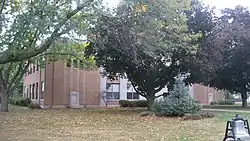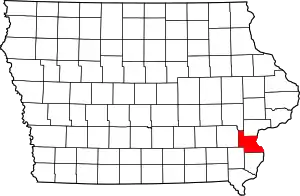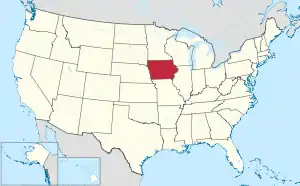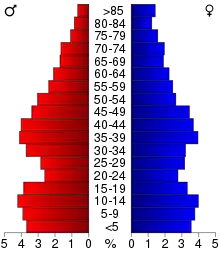Louisa County | |
|---|---|
 Louisa County Courthouse in Wapello | |
 Location within the U.S. state of Iowa | |
 Iowa's location within the U.S. | |
| Coordinates: 41°13′05″N 91°15′36″W / 41.218055555556°N 91.26°W | |
| Country | |
| State | |
| Founded | 1836 |
| Seat | Wapello |
| Largest city | Wapello |
| Area | |
| • Total | 418 sq mi (1,080 km2) |
| • Land | 402 sq mi (1,040 km2) |
| • Water | 16 sq mi (40 km2) 3.8% |
| Population (2020) | |
| • Total | 10,837 |
| • Density | 26/sq mi (10/km2) |
| Time zone | UTC−6 (Central) |
| • Summer (DST) | UTC−5 (CDT) |
| Congressional district | 2nd |
| Website | louisacountyia |
Louisa County (/luˈaɪzə/ loo-EYE-zə) is a county located in the U.S. state of Iowa. As of the 2020 census, the population was 10,837.[1] The county seat is Wapello.[2]
Louisa County is part of the Muscatine Micropolitan Statistical Area.
History
Louisa County was formed on December 7, 1836, as a part of Wisconsin Territory.[3] Two theories have been offered for the origins of its name: one is that it was named after Louisa Massey,[4] who was very well known in the area at the time because she avenged the murder of her brother when she shot the party responsible; the other is that it was named after Louisa County, Virginia.[5] Louisa County became a part of Iowa Territory upon its formation on July 4, 1838.[3]
The first courthouse was a simple wood-framed building. In 1840, a second courthouse, measuring 40' x 20' (about 12 x 6 m), was constructed of stone. In 1854, a third structure was built. The courthouse used today was erected in 1928.[6]
Geography
According to the U.S. Census Bureau, the county has a total area of 418 square miles (1,080 km2), of which 402 square miles (1,040 km2) is land and 16 square miles (41 km2) (3.8%) is water.[7] Its eastern border is adjacent to the Mississippi River.
Major highways
Adjacent counties
- Johnson County (northwest)
- Muscatine County (north)
- Rock Island County, Illinois (northeast)
- Mercer County, Illinois (east)
- Des Moines County (south)
- Henry County (southwest)
- Washington County (west)
National protected area
Demographics
| Census | Pop. | Note | %± |
|---|---|---|---|
| 1850 | 4,939 | — | |
| 1860 | 10,370 | 110.0% | |
| 1870 | 12,877 | 24.2% | |
| 1880 | 13,142 | 2.1% | |
| 1890 | 11,873 | −9.7% | |
| 1900 | 13,516 | 13.8% | |
| 1910 | 12,855 | −4.9% | |
| 1920 | 12,179 | −5.3% | |
| 1930 | 11,575 | −5.0% | |
| 1940 | 11,384 | −1.7% | |
| 1950 | 11,101 | −2.5% | |
| 1960 | 10,290 | −7.3% | |
| 1970 | 10,682 | 3.8% | |
| 1980 | 12,055 | 12.9% | |
| 1990 | 11,592 | −3.8% | |
| 2000 | 12,183 | 5.1% | |
| 2010 | 11,387 | −6.5% | |
| 2020 | 10,837 | −4.8% | |
| U.S. Decennial Census[8] 1790-1960[9] 1900-1990[10] 1990-2000[11] 2010-2018[12] | |||

2020 census
The 2020 census recorded a population of 10,837 in the county, with a population density of 25.9886/sq mi (10.0343/km2). There were 4,712 housing units, of which 4,180 were occupied.[1]
| Race | Num. | Perc. |
|---|---|---|
| White (NH) | 8,485 | 78.3% |
| Black or African American (NH) | 73 | 0.7% |
| Native American (NH) | 11 | 0.1% |
| Asian (NH) | 265 | 2.5% |
| Pacific Islander (NH) | 0 | 0% |
| Other/Mixed (NH) | 275 | 2.54% |
| Hispanic or Latino | 1,728 | 16% |
2010 census
The 2010 census recorded a population of 11,387 in the county, with a population density of 28.3315/sq mi (10.9389/km2). There were 5,002 housing units, of which 4,346 were occupied.[14]
2000 census

As of the census[15] of 2000, there were 12,183 people, 4,519 households, and 3,316 families residing in the county. The population density was 30 inhabitants per square mile (12/km2). There were 5,133 housing units at an average density of 13 per square mile (5.0/km2). The racial makeup of the county was 93.91% White, 0.25% Black or African American, 0.18% Native American, 0.20% Asian, 0.02% Pacific Islander, 4.56% from other races, and 0.88% from two or more races. 12.62% of the population were Hispanic or Latino of any race.
There were 4,519 households, out of which 35.00% had children under the age of 18 living with them, 61.30% were married couples living together, 8.20% had a female householder with no husband present, and 26.60% were non-families. 22.50% of all households were made up of individuals, and 10.40% had someone living alone who was 65 years of age or older. The average household size was 2.66 and the average family size was 3.11.
In the county, the population was spread out, with 27.70% under the age of 18, 7.90% from 18 to 24, 28.70% from 25 to 44, 21.70% from 45 to 64, and 14.10% who were 65 years of age or older. The median age was 36 years. For every 100 females, there were 98.90 males. For every 100 females age 18 and over, there were 96.00 males.
The median income for a household in the county was $39,086, and the median income for a family was $43,972. Males had a median income of $31,293 versus $22,085 for females. The per capita income for the county was $17,644. About 7.00% of families and 9.30% of the population were below the poverty line, including 12.40% of those under age 18 and 7.90% of those age 65 or over.
Communities
Cities
Unincorporated community
- Cairo
- Toolesboro
Population ranking
The population ranking of the following table is based on the 2010 census of Louisa County.[1]
† county seat
| Rank | City/Town/etc. | Municipal type | Population (2020 Census) |
|---|---|---|---|
| 1 | † Wapello | City | 2,084 |
| 2 | Columbus Junction | City | 1,830 |
| 3 | Morning Sun | City | 752 |
| 4 | Grandview | City | 437 |
| 5 | Columbus City | City | 392 |
| 6 | Letts | City | 363 |
| 7 | Fredonia | City | 222 |
| 8 | Oakville | City | 200 |
| 9 | Cotter | City | 39 |
Government
Townships
Politics
Louisa County, like nearby Cedar County, is a reliable bellwether for the state of Iowa, having voted for the statewide winner in every presidential election since 1952.
| Year | Republican | Democratic | Third party | |||
|---|---|---|---|---|---|---|
| No. | % | No. | % | No. | % | |
| 2020 | 3,500 | 65.64% | 1,726 | 32.37% | 106 | 1.99% |
| 2016 | 3,069 | 61.28% | 1,648 | 32.91% | 291 | 5.81% |
| 2012 | 2,420 | 48.71% | 2,452 | 49.36% | 96 | 1.93% |
| 2008 | 2,314 | 47.02% | 2,523 | 51.27% | 84 | 1.71% |
| 2004 | 2,572 | 52.32% | 2,297 | 46.72% | 47 | 0.96% |
| 2000 | 2,207 | 47.60% | 2,294 | 49.47% | 136 | 2.93% |
| 1996 | 1,565 | 36.61% | 2,081 | 48.68% | 629 | 14.71% |
| 1992 | 1,691 | 34.91% | 2,091 | 43.17% | 1,062 | 21.92% |
| 1988 | 2,060 | 47.03% | 2,268 | 51.78% | 52 | 1.19% |
| 1984 | 2,623 | 57.36% | 1,927 | 42.14% | 23 | 0.50% |
| 1980 | 2,530 | 55.19% | 1,700 | 37.09% | 354 | 7.72% |
| 1976 | 2,284 | 51.43% | 2,089 | 47.04% | 68 | 1.53% |
| 1972 | 2,806 | 61.31% | 1,707 | 37.30% | 64 | 1.40% |
| 1968 | 2,529 | 56.40% | 1,632 | 36.40% | 323 | 7.20% |
| 1964 | 1,845 | 41.17% | 2,624 | 58.56% | 12 | 0.27% |
| 1960 | 3,036 | 60.67% | 1,966 | 39.29% | 2 | 0.04% |
| 1956 | 3,184 | 63.07% | 1,858 | 36.81% | 6 | 0.12% |
| 1952 | 3,675 | 68.45% | 1,673 | 31.16% | 21 | 0.39% |
| 1948 | 2,420 | 54.64% | 1,945 | 43.92% | 64 | 1.45% |
| 1944 | 2,745 | 58.67% | 1,894 | 40.48% | 40 | 0.85% |
| 1940 | 3,330 | 59.18% | 2,247 | 39.93% | 50 | 0.89% |
| 1936 | 2,655 | 47.28% | 2,859 | 50.92% | 101 | 1.80% |
| 1932 | 2,045 | 40.99% | 2,856 | 57.25% | 88 | 1.76% |
| 1928 | 3,275 | 68.80% | 1,457 | 30.61% | 28 | 0.59% |
| 1924 | 2,952 | 64.89% | 643 | 14.13% | 954 | 20.97% |
| 1920 | 3,560 | 77.49% | 932 | 20.29% | 102 | 2.22% |
| 1916 | 1,876 | 62.26% | 1,081 | 35.88% | 56 | 1.86% |
| 1912 | 1,070 | 36.36% | 881 | 29.94% | 992 | 33.71% |
| 1908 | 2,025 | 65.92% | 978 | 31.84% | 69 | 2.25% |
| 1904 | 2,147 | 72.61% | 663 | 22.42% | 147 | 4.97% |
| 1900 | 2,185 | 63.30% | 1,172 | 33.95% | 95 | 2.75% |
| 1896 | 2,035 | 59.12% | 1,334 | 38.76% | 73 | 2.12% |
See also
References
- 1 2 3 "2020 Census State Redistricting Data". census.gov. United states Census Bureau. Retrieved August 12, 2021.
- ↑ "Find a County". National Association of Counties. Retrieved June 7, 2011.
- 1 2 "WI: Individual County Chronologies". publications.newberry.org. Archived from the original on April 14, 2017. Retrieved September 28, 2016.
- ↑ Gannett, Henry (1905). The Origin of Certain Place Names in the United States. U.S. Government Printing Office. p. 191.
- ↑ Savage, Tom A Dictionary of Iowa Place Names, University of Iowa Press, 2007, p. 11 ISBN 1587297590
- ↑ "Louisa County, Iowa". Archived from the original on September 5, 2019. Retrieved January 20, 2008.
- ↑ "US Gazetteer files: 2010, 2000, and 1990". United States Census Bureau. February 12, 2011. Retrieved April 23, 2011.
- ↑ "U.S. Decennial Census". United States Census Bureau. Retrieved July 18, 2014.
- ↑ "Historical Census Browser". University of Virginia Library. Retrieved July 18, 2014.
- ↑ "Population of Counties by Decennial Census: 1900 to 1990". United States Census Bureau. Retrieved July 18, 2014.
- ↑ "Census 2000 PHC-T-4. Ranking Tables for Counties: 1990 and 2000" (PDF). United States Census Bureau. Archived (PDF) from the original on March 27, 2010. Retrieved July 18, 2014.
- ↑ "State & County QuickFacts". United States Census Bureau. Archived from the original on June 7, 2011. Retrieved July 18, 2014.
- ↑ "P2 HISPANIC OR LATINO, AND NOT HISPANIC OR LATINO BY RACE – 2020: DEC Redistricting Data (PL 94-171) – Louisa County, Iowa".
- ↑ "Population & Housing Occupancy Status 2010" (PDF). United States Census Bureau American FactFinder. Archived (PDF) from the original on October 16, 2020. Retrieved August 15, 2022.
- ↑ "U.S. Census website". United States Census Bureau. Retrieved January 31, 2008.
- ↑ Leip, David. "Dave Leip's Atlas of U.S. Presidential Elections". uselectionatlas.org. Retrieved April 26, 2018.
External links
- Louisa County Archived September 5, 2019, at the Wayback Machine